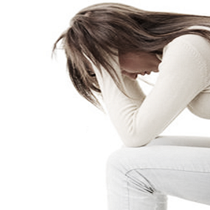Premenstrual syndrome (PMS) is a group of symptoms that affects many women a few days before the start of their menses and typically settles down once the period starts. The cause is related mainly to change in hormonal levels. The type and severity of symptoms, can vary in different women and can include both physical and emotional symptoms.
The physical symptoms include bloating, weakness, fatigue, joint/muscle pains, low back pain, indigestion, changes in bowel habits (diarrhea or constipation), flaring up of acne, tender feeling in breasts, difficulty in sleeping and headaches. The emotional symptoms include mood swings, anxiety or depression, irritability, crying spells, increased sensitivity and disinterest in sexual activities.
PMS can sometimes cause a significant disturbance in the personal and professional lives of women, and the symptoms are frequently mislabeled as maladjusted personality traits or behavioral issues. PMS can be managed by medical evaluation, lifestyle modifications and most importantly care, understanding and support from loved ones and colleagues.
Here are 5 important measures which can help:
MEDICAL EVALUATION
It is important to rule out other medical conditions that can present like PMS or exaggerate the symptoms of PMS. PMS symptoms typically increase by around 30% in the 6 days before menstruation, ease out with the start of the period and are not present in the initial 2 weeks of the cycle (this pattern being definite in at least two consecutive cycles).
A general history and medical examination and ruling out the presence of any other medical conditions like migraine, irritable bowel syndrome (IBS), allergies or metabolic disorders are essential. BP check and baseline blood tests like CBC (to rule out anemia), blood sugar, thyroid function, vitamin D and B12 levels should be done. A personal and family history of mood disorders, anxiety-depression or substance abuse should be enquired about. PMS should be differentiated from dysmenorrhea (pain/cramps after the start of the period). An appropriate consult to rule out the presence of gynecological conditions like endometriosis, fibroids, polycystic ovarian syndrome (PCOS), and assessing contraceptive use, possible start of menopause, or other menstrual irregularities is also recommended.
MAINTAINING A SYMPTOM DIARY
Maintaining a record of the day of the cycle the symptoms started, what were all the symptoms, and a note of the diet, lifestyle, physical activity, and other events during that period, can be one of the most useful things to do. This helps to diagnose PMS, raise the possibility of any other medical condition, evaluate the severity of symptoms and also understand triggers and aggravating factors.
Some such readymade record-keeping formats are available, however, it is best that each woman maintains the record in the way most convenient and comfortable for her. Record keeping often reduces the stress and anxiety which comes with and aggravates the symptoms and helps organize lifestyle better on those days.
DIET
Incorporate a healthy and nutritious diet. Reduce intake of salt, as that helps to decrease bloating, breast tenderness and water retention. Also cut down on sugar, processed food, and fat intake during these days. Eat a diet rich in vegetables (especially green leafy vegetables), fruits, whole grains, unsalted nuts (like almonds and walnuts), soy, fish, eggs, olive oil, and low-fat dairy items. This helps to increase the intake of B group vitamins, vitamin D, vitamin E, omega 3 fats, calcium and iron. Restrict alcohol and caffeine during this period and instead increase water intake, which helps to smoothen digestive complaints and mood swings.
LIFESTYLE AND EXERCISE
At least 30-45 minutes of physical exercise should be included daily throughout the cycle. Aerobic activities like jogging, brisk walking, swimming or cycling are appropriate. Yoga and breathing exercises help reduce anxiety and stress. Getting 8 hours of good quality sleep every night is very important. Cutting down smoking can also have a favorable impact. Talking and discussing your symptoms with spouse, family or friends can be supportive and comforting.
MEDICINES AND SUPPLEMENTS
There is still limited evidence in this regard. Nutritional supplements like vitamin D, calcium, magnesium, vitamin B group, and vitamin E may be given as supportive therapy in addition to diet and lifestyle modification. Over the counter herbal supplements are also available but these need more evidence and are better taken after medical consultation.
In patients, who have significant water retention or bloating, diuretic medicines are sometimes prescribed. Oral contraceptives or hormonal therapy may be used in certain women with severe symptoms under the guidance of a gynecologist. In cases where mood swings or emotional symptoms are prominent or severe, medications of the antidepressant SSRIs (selective serotonin receptor inhibitors) class may be prescribed. If body pain, muscle pains or joint pains are the major symptoms, drugs of class NSAID (non-steroidal anti-inflammatory drugs) are advised. Evening primrose oil may be of some benefit in reducing associated breast tenderness.
PMS can be of great distress to women compromising their quality of life. Tackling this systematically and holistically helps in relieving symptoms, improving productivity and overall health of women.
Further Reading –
For any query, additional information or to discuss any case, write to info@drvarsha.com and be assured of a response soon.
Reference: Womenhealth.gov – PMS


